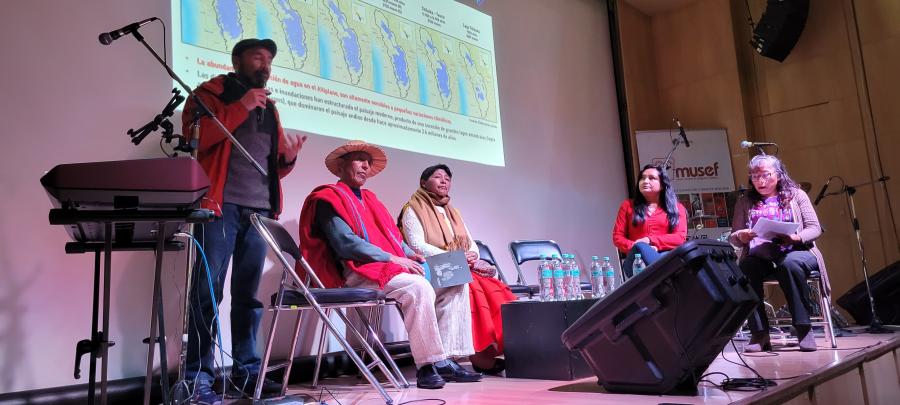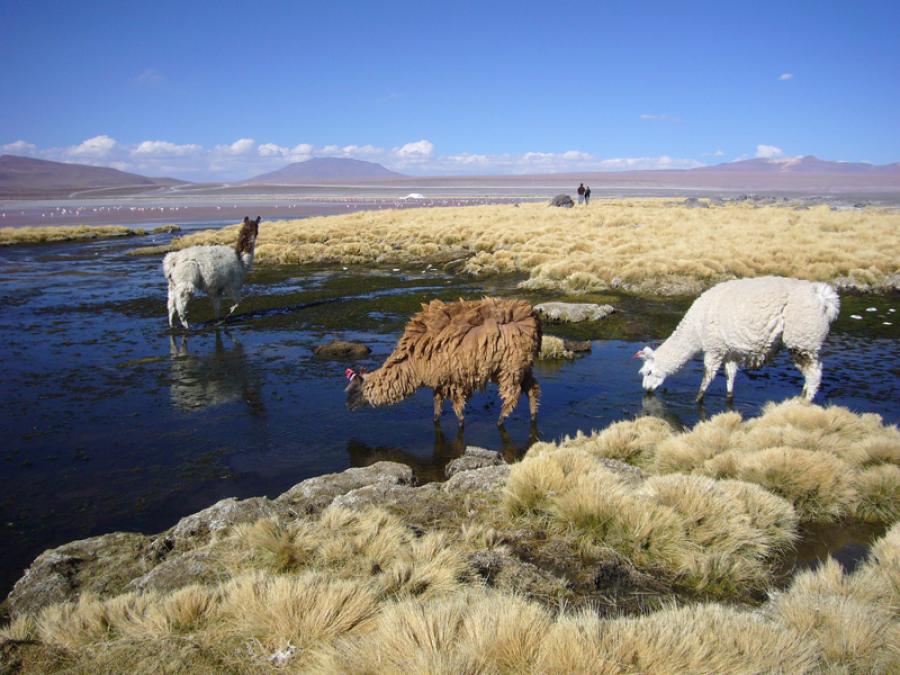Government authorities succumb to pressure from Indigenous Organizations, Local Civic Committees, Ombudsman Office and National and International NGOs.
The initial phase of the Environmental Audit of the Cuiaba gas pipeline, requested a year ago by indigenous organizations representing the Chiquitano and Ayoreo peoples, began today in San Jose de Chiquitos with the arrival of a large delegation of inspectors from the Vice-Ministry of Sustainable Development. The delegation was led by Christina Orellana, Director of the Environmental Unit, whose main task is to verify claims from affected communities regarding non-compliance with Environmental Impact Assessments (EIA).
A group of indigenous environmental monitors and civic leaders from the affected areas formally submitted the findings of an independent monitoring report to back up their claims. They were joined by non-governmental organizations as well as Deputy Isaac Avalos of the National Congress. The report documents non-compliance with reforestation plans, indigenous development plans, and destruction of natural habitats and water sources that are essential to the livelihoods of indigenous communities. It also demonstrates that the project sponsors, Enron and Shell, along with government institutions, violated Bolivian Law 1257 (ILO Convention 169) by establishing the Chiquitano Forest Conservation Foundation (FCBC), while excluding affected indigenous peoples from participating in managing the natural resources within their territories.
Enron and Shell's controversial Foundation was accused of inappropriate use of influence after it was found that scientists from several conservation organizations, who initially supported a proposal to change the pipeline route to avoid irreversible damage to the pristine Chiquitano forest (then considered to be among the top 200 in the world in terms of conservation), later changed their position in exchange for $20 million (U.S.) for a failed conservation plan. Lack of transparency around fund negotiations led to divisions between the World Wildlife Fund (WWF) and these questionable oil companies. In 2001, it was revealed by international media sources that FCBC members committed biopiracy by exporting, without authorization, genetic samples of a "wild peanut" native to the Chiquitano forest.
In May 2002, an investigations commission from the Bolivian National Parliament found that Enron had created a "ghost foundation" that was used by company staff to buy shares in the Cuiaba pipeline, thereby superficially increasing its value in order to reap large profits, while defrauding legitimate shareholders. The Overseas Private Investment Corporation, a U.S. export credit agency, withdrew its support for the project in the midst of Enron's scandalous bankruptcy. To date, the company has been attributed with an estimated $2.5 billion (U.S.) in fraudulent losses.
A few months later Bolivia's Ministry of Sustainable Development cited Enron and Shell's FCBC for violations of national environmental laws. However, it remains unclear why Bolivian government authorities have failed to institute applicable economic sanctions. In the meantime, Enron continues to be Bolivia's primary partner for gas exports to Brazil.
The Cuiaba pipeline affair came into the spotlight once again in November 2002. While President-elect Sanchez de Lozada was visiting Washington, D.C., indigenous parliamentarians and environmental organizations revealed the discovery of a valve built secretly into the pipeline to provide gas for the Don Mario mine. The mine belongs to Orvana Minerals, a company whose primary shareholder is President Sanchez de Lozada himself. When the valve was discovered, it was also found that an additional pipeline was under construction for exclusive use in the mine. Neither the valve nor the new pipeline was ever considered in the original environmental impact studies.
“This confirms that Enron has committed specific crimes, which should result in its ouster from Bolivia,” said Deputy Issac Avalos. “Now we hope that all irregularities will be investigated, that the social and environmental impacts of the project will be assessed, and that concrete solutions will be found to repair the damage suffered by the 31 indigenous communities affected and to mitigate the destruction to the ecosystems of the Chiquitano forest and Bolivian Pantanal,” he added.
An environmental audit process, which begins with inspections in situ of the claims, is unprecedented in Bolivia, given that environmental law does not clearly address social impacts or indigenous rights violations. It will require an integrated and multidisciplinary approach so that its findings could set an important precedent to better regulate hydrocarbon project implementation in indigenous territories.
“It is concerning in this initial phase that government authorities responsible for the inspection, who should be enforcing national laws and defending the public interest, are being hosted, and apparently assisted financially, by the corporations. While this sort of dependence exists transparency in the process is unlikely,” said José Bailaba, a Chiquitano member of Congress.
The initial inspections will take place from April 15 - 26, which coincides with the current national debate over potential construction of another gas pipeline that will transport gas to the Pacific coast, for export to the U.S. The Pacific LNG project has sparked serious divisions within the Sanchez de Lozada administration, where strong opposition exists, including from the Armed Forces. Recent polls show that a majority of Bolivians believes that under current conditions, gas pipeline projects only benefit multinational corporations rather than the country as a whole.
The irony is that the environmental audit of the Cuiaba pipeline could prove that while Enron and shell will gain profits for the next forty years, Bolivians will be left only with environmental destruction and increasing poverty for the affected communities.
Derrick Hindery recently received his Ph.D from the UCLA Department of Geography. In 2002 he published his doctoral dissertation on Enron and Shell’s involvement in the Cuiaba pipeline. This article appears courtesy of Amazon Watch.


